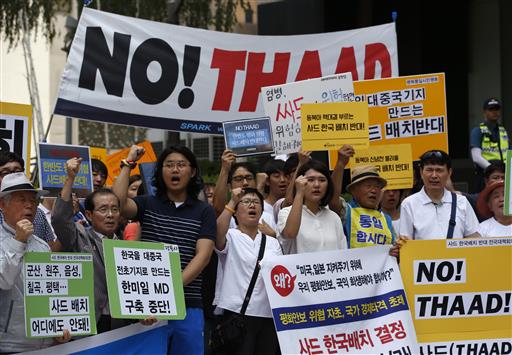
South Koreans shout slogans during a rally to denounce deploying the Terminal High-Altitude Area Defense, or THAAD, near U.S. Embassy in Seoul, South Korea, Monday, July 11, 2016. Seoul and Washington launched formal talks on deploying the Terminal High-Altitude Area Defense, or THAAD, after North Korea conducted a nuclear test and a long-range rocket launch earlier this year. (AP Photo/Lee Jin-man)
SEOUL, South Korea — North Korea said Monday it will end a diplomatic communication channel with the United States and hinted at harsher punishment for Americans detained in the country in retaliation for U.S. sanctions that target leader Kim Jong Un.
The U.S. government last week imposed penalties on Kim and 10 other top officials for alleged human rights abuses. North Korea is already sanctioned because of its nuclear weapons program, but it was the first time that Kim has been personally sanctioned. The North called the sanctions tantamount to a war declaration.
READ: US punishing North Korean leader for human rights abuses
On Monday, the North’s state media said it told the United States it will terminate contact through a U.N. channel in New York that allowed diplomats to communicate.
The North also said it informed Washington that it will handle all issues between the two countries according to an unspecified wartime law, including Americans detained in North Korea, according to the state-run Korean Central News Agency.
South Korean media have suggested this might mean that North Korea will impose harsher punishments on Americans detained in the North.
The North’s actions could complicate U.S. efforts to secure the release of at least two American citizens being held for alleged espionage, subversion and other anti-state activities. One is serving a 10-year prison term with hard labor while the other received 15 years.
The North’s announcement came hours after it made more threats, this time over a U.S. plan to deploy an advanced missile defense system in South Korea.
The North’s threat, carried in state media, was typical of past bluster. It came three days after Seoul and Washington said they were close to determining a location in South Korea for the Terminal High-Altitude Area Defense, or THAAD, system to better deal with North Korean threats.
READ: North Korea to take ‘physical action’ over US anti-missile system
The North said it will take an unspecified “physical counter-action” as soon as the THAAD location is announced. The statement also carried one of the North’s favorite, oft-repeated threats: To turn Seoul into a “sea of fire.” It has regularly warned it would do that since 1994. U.S. and South Korean officials say THAAD only targets North Korea, but China and Russia suspect it could also help U.S. radars detect their own missiles.
South Korea’s President Park Geun-hye said Monday she agreed on the U.S. missile deployment because North Korea has openly threatened to launch nuclear and missile attacks on South Korea.
The two Koreas are divided along the world’s most heavily fortified border. The United States stations about 28,500 soldiers in South Korea.